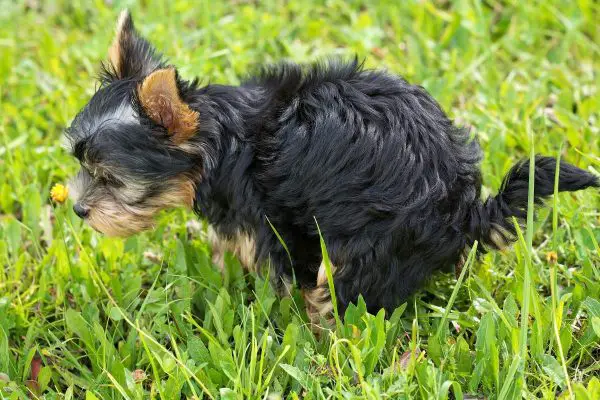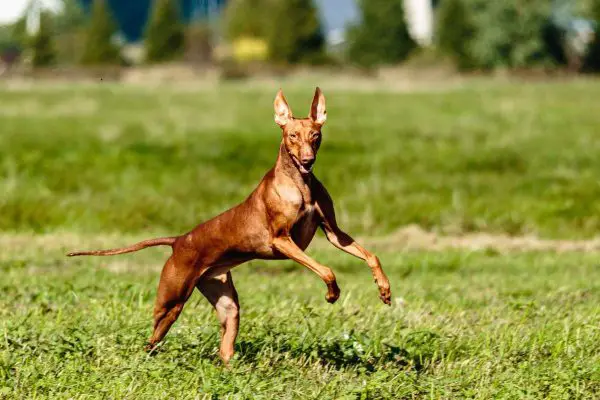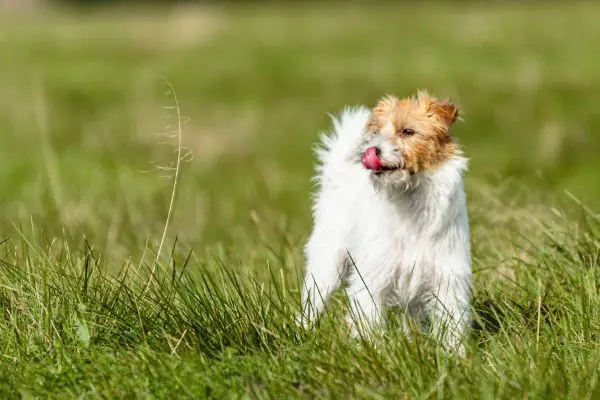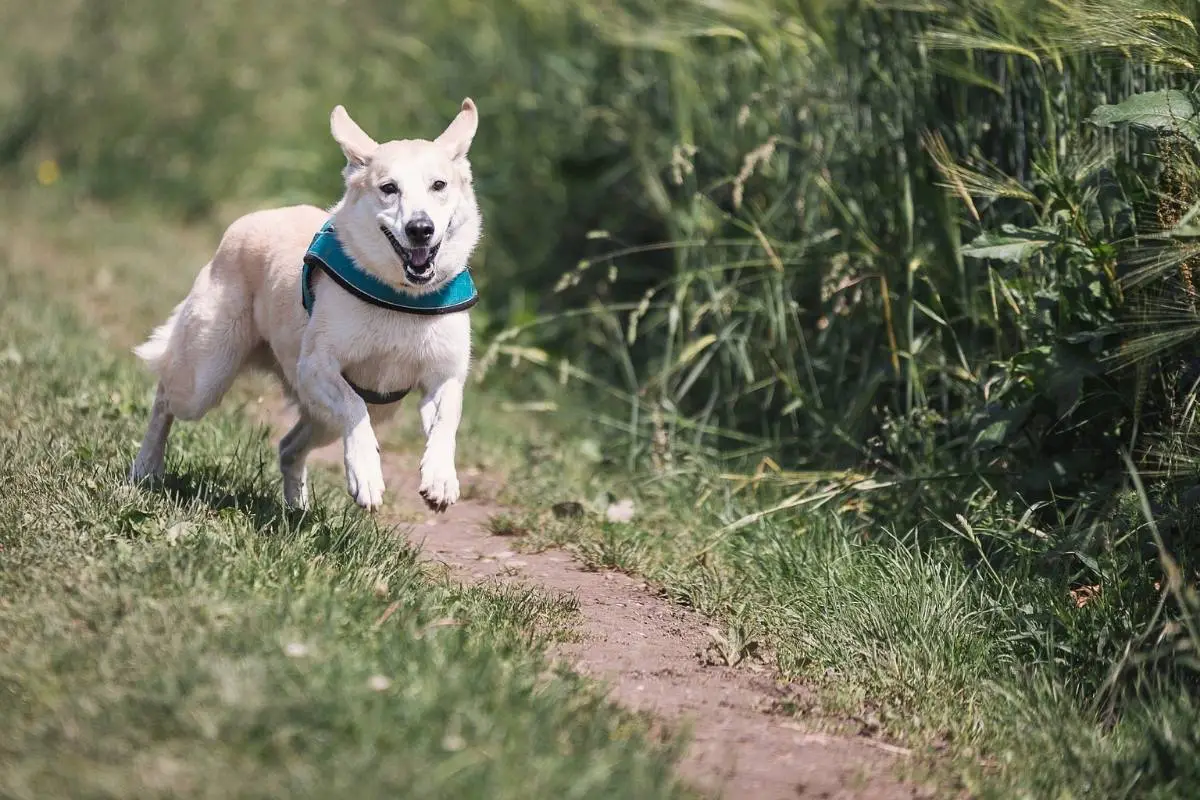Dogs can get super excited about things that don’t always make sense to us humans. Some even get a little crazy about pooping. If your dog goes bonkers before a bowel movement, don’t worry—it’s not that unusual.
But, why does my dog hyper before pooping? Your dog’s hyperactivity may be its way of telling you that it needs to go out, a way of burning surplus energy and enthusiasm, or a natural way to encourage bowel movements. In other cases, it may indicate discomfort associated with health issues like constipation or impacted anal glands.
In this article we’ll give you a better understanding for why your dog is displaying this type of behavior along with other related information that you may find useful.
The What and Why of Poop Zoomies

Pre-pooping excitement in dogs is common enough that it even has a name. Most people refer to it as the poop zoomies, or just the zoomies.
Dogs get the zoomies when they’re overexcited, happy, or relieved. They may get them when someone they love comes to visit, after a bath, or after a vet visit. Some dogs get the zoomies for no apparent reason at all—they’re just happy to be alive. Interestingly, you might notice that some dogs exhibit the zoomies before poop or even after, possibly expressing their excitement or anticipation associated with the outdoor routine.
Pooping is Important
The poop zoomies are most often seen in young dogs or puppies. Not only are puppies just learning to poop in appropriate places, they are also more easily excited by nature. A young dog may try to tell you it needs to go outside by running in circles, jumping about, and generally acting hyper.
Once the dog is outside, its hyperactivity may persist as it looks for the perfect place to do its business. This is completely natural. Where a dog poops is important to them as it can be associated with marking their territory. Dogs will also be inclined to poop away from sleeping or feeding areas and will often prefer to use the same general area each time they go.
Some dogs may also be nervous about pooping in an unfamiliar place or while on a leash. Their nervousness can show up in leash-pulling, jumping, hyperactive running about, and a reluctance to settle on a place to do their business.
Pooping is Exciting
A naturally energetic dog may get hyper before pooping simply because it’s so excited to go outside. A dog that is overreacting to going out to poop may need more frequent chances to go outside, longer walks, and more regular playtimes.
A dog may also get excited about pooping because it knows it’s been praised for pooping in appropriate places before and is proud of itself for doing so again.
They Just Really Need to Go

Hyperactivity before pooping can also be a dog’s way of getting its bowels moving in preparation for passing stools. A dog that has trouble pooping can benefit from some mild activity beforehand like a walk or a short session of playing fetch.
If your dog is in a situation where it’s not sure if it’s okay to poop, but it really needs to go, it may appear overly excited or eager to move on. If it’s truly not the best place for your dog to do its business, this hyperactivity can alert you to the situation, hopefully giving you a chance to take it to a more appropriate area.
A dog who becomes hyper about pooping may have given you several more subtle signs that it needed to go before you actually noticed. Going crazy may be its final resort. Try to notice the quieter indications your dog gives that it needs to go outside, like restlessness or wandering.
Finally, an overexcited or nervous dog may react to an overstimulating situation by pooping. In this case, your dog’s pooping may actually be a result of its hyperactivity, which was a result of its unsettled emotions.
Is Something Wrong with My Dog?
In most cases, the poop zoomies are nothing to be concerned about. They’re just your dog’s way of letting you know what it needs, burning access energy, or celebrating his perceived accomplishment. Many young dogs eventually outgrow the poop zoomies, and those who don’t are endearing with their pup-like enthusiasm.
Difficulty Pooping
If your dog strains abnormally while pooping or sometimes fails to poop in spite of trying, it’s time to get a bit more concerned. These can be signs of constipation or impacted anal glands. These are both common ailments in dogs, but they are also painful and potentially dangerous if left untreated. If you notice any of the following symptoms, it may be time to check in with your vet.
- Your dog strains or cries when trying to pass stools
- Your dog’s stools are hard and dry
- Your dog has diarrhea or passes mucus
- Your dog licks obsessively at his rear end
- Your dog often drags his rear end along the ground as if scratching it
I know, no one really wants to check out their dog’s poop, but poop abnormalities can be a great early sign to other health issues, so it’s a good idea to regularly take a look and make sure everything’s okay.
Nerves and Excess Energy
Hyperactivity around pooping that is due to nervousness or excess energy should also be addressed as stress is not good for your dog and can show itself in other less innocuous behaviors. Make sure your dog is getting plenty of exercise and time outside beyond just trips outside to poop.
If your dog seems to be nervous or uncertain about pooping, try to determine the cause of its nervousness. Is it some unconscious cue you’re giving or emotion you’re exuding? Is your dog upset by the presence of other dogs or frightened by something else in the area?
Some dogs even prefer to poop in private and may be anxious about going while you’re standing a few feet away on the end of a leash or anywhere within sight. Although you may not be able to unleash your dog (please don’t, unless you are in a safe area without leash laws), it may be more comfortable on a longer leash or if you turn away and pretend to be paying no attention.
Why Do Dogs Take So Long to Poop?
The duration of a dog’s bowel movement can vary based on individual factors, health, and habits. Generally, the time a dog takes to poop is influenced by several factors, including breed, size, age, and diet. Larger breeds may take longer due to their size and digestive processes, while smaller dogs might finish more quickly.
Additionally, age plays a role, as puppies may take longer as they explore their surroundings, while older dogs might have a more efficient routine. Diet is another significant factor; a well-balanced diet with adequate fiber can promote regular and timely bowel movements.
In some cases, dogs may take longer due to environmental factors, such as distractions or unfamiliar surroundings. While occasional variations are normal, persistent changes in bathroom habits may warrant a veterinarian’s attention to rule out underlying health issues.
How to Discourage Poop-related Hyperactivity

A little excitement over their poop is usually not a problem, especially for young dogs who are still learning the ropes, but a dog that continues to act up before pooping can be embarrassing in public settings, and a dog that gets too out of control can cause trouble. Fortunately, there are some steps you can take to discourage too much hyperactivity associated with pooping.
Basic Training
Learning to walk nicely on a leash, come when called, sit on command, and follow other basic rules of good behavior does not only make your dog a much better companion for you and other people.
Knowing how to behave in various situations also increases your dog’s confidence in you and itself. Basic training can go a long way in eliminating hyper behavior related to nervousness or uncertainty.
Sufficient, Regular Exercise
A dog that is regularly out and about is less likely to make a big deal about pooping. Regular walks and playtimes will help keep your dog’s bowel movements naturally healthy and will also decrease its need to burn off extra energy via overexcited poop zoomies.
Undramatic Reactions
Praising a puppy for pooping in the appropriate place at the appropriate time will help it learn how to be a polite adult dog. However, it’s not necessary to continue this type of reaction once your dog knows what to do and when.
If your dog gets overexcited about pooping because you’ve encouraged it—intentionally or otherwise—you may be able to curb this behavior by toning down your affirmation.
When your dog gets the poop zoomies or starts jumping about, don’t add to the moment’s excitement by grabbing or chasing it or speaking in a loud or emphatic voice. Instead, calm your dog by speaking in a firm, kind tone and redirecting his energy as much as possible.
You may wish to have him sit or heel for a moment to calm down. Pay as little attention to the fact that your dog has or is about to poop as possible, and eventually your dog will begin taking its cue from you that this isn’t actually that big of a deal.
Conclusion
Unless your dog is suffering from constipation or other issues that make pooping difficult or uncomfortable, hyper behavior related to pooping is probably just a symptom of overexcitement or uncertainty. It’s especially common in young dogs who are just figuring out the world, and most will grow out of it.
Dogs can see pooping as something of an accomplishment or declaration to the world and may be overproud or anxious about it. There’s nothing inherently wrong with a bit of excitement, but if your dog is getting out of control or phobic about pooping, it will be in everyone’s best interest for you to gently discourage this type of behavior.

